Sydney Sweeney on Fame, Hollywood Fakery and the Pressure of Paying the Bills

This summer, Sydney Sweeney experienced her first glimpse of millennial burnout. At 24, the actress is by definition a member of Gen Z, but this feels like a technicality given the amount of life experience she has. The panic attacks began in June, fast and furious events that convinced her brain she was probably dying. “I was losing my shit,” she says.
She went home to the Pacific Northwest for two weeks of family-mandated phone-free time, grounding herself in the region’s fresh air, “hiking and skiing and doing what I truly love.” The regimen worked in the immediate sense — though, she adds, “I still can’t get my mind to shut up, and I don’t sleep” — and helped her realize that her punishing schedule of back-to-back film and TV projects was working against her. It’s a hard lesson to accept, given the amount of pressure Sweeney feels to maximize this pivotal moment in her career — and the way the very same anxiety often will convince her that the momentum could stop at any time.
More from The Hollywood Reporter
Inside 'House of the Dragon' Part 2: "It's a Powerful, Dark, Shakespearean Tragedy"
'Euphoria,' 'Yellowjackets,' 'Big Sky' Among Series to Get ReFrame Stamp of Approval
Inside 'House of the Dragon': The Epic Mission to Make the Next 'Game of Thrones'
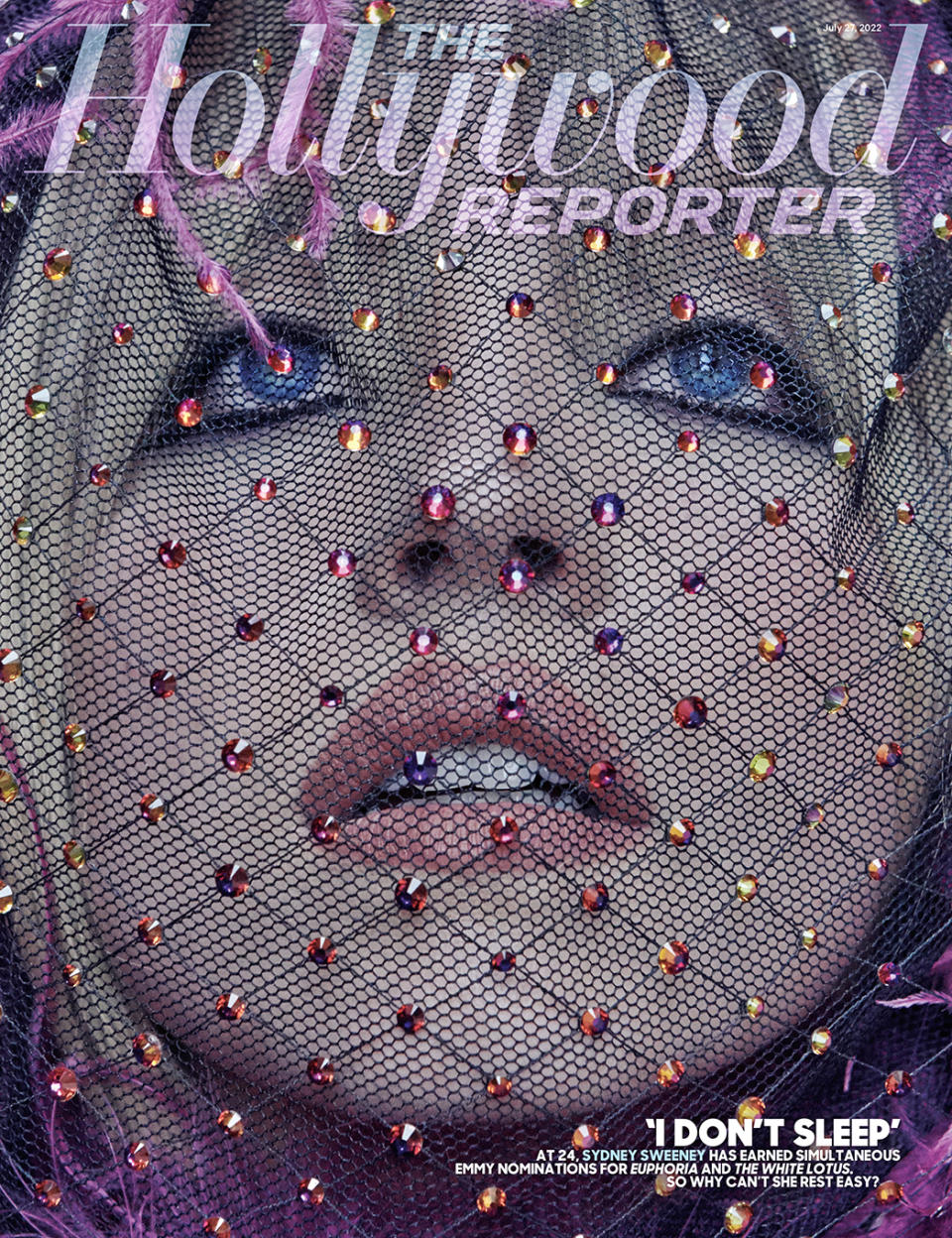
We’re having breakfast in New York, three days after the Emmy nominations were announced; she scored nods for both Euphoria (supporting actress in a drama) and The White Lotus (supporting actress in a limited series). She has just flown down from Boston to New York, where she’s spending several months in production for Marvel’s Madame Web movie, with very little publicly known about her character. I’ve been asking her about her time in the New England city in hopes of gleaning something — anything — about the highly secretive Spider-Man offshoot.
“I’m a very open person,” she says. “I love to talk about everything,” noting the fact that it eats at her that she can’t open up about Madame Web. I eventually learn that she’s preparing for the role with fight training, movement training and something called Reformacore Pilates, and that she was drawn to the film because she “liked the personal struggles that the character goes through.” She spends a lot of time talking about the cross-country road trip she took — with her mother and her rescue dog, Tank — to get to Boston and how she much prefers that city’s slower pace to New York’s frenetic nature. Here on the rooftop of Sweeney’s favorite Manhattan hotel, though, we’re insulated from the chaos of midtown.
The venue is different than the places one would expect to find burgeoning A-listers — the Sunset Tower it is not — but she’s become friends with the staff and even good-natured ribbing from friends and family hasn’t persuaded her to decamp for fancier pastures. Her loyalty proves to be valuable currency when, later, endless boxes full of designer fashion for this shoot start arriving at the happily accommodating front desk at record pace.
Over the course of her short career, she’s had to learn how to make herself at home pretty much anywhere. White Lotus introduced a certain Eloise at the Plaza energy into her life: The HBO miniseries, a darkly satirical examination of white privilege at an upscale Hawaiian resort, was shot on location at the Four Seasons in Maui during the throes of the pandemic. The sequestration was a COVID-protocol necessity but lent itself greatly to the project, giving the cast — fellow Emmy nominees Connie Britton (who plays her mother), Murray Bartlett, Jake Lacy, Steve Zahn, Jennifer Coolidge, Alexandra Daddario and Natasha Rothwell — a chance to immediately bond via what Sweeney describes as an idyllic routine of celebrating each day’s wrap with a sunset swim. Britton mentions during a phone call that she and Sweeney actually met for the first time in the pool at the Four Seasons. “To be honest, the shoot was more fun for the cast than for me,” show creator Mike White says with a laugh when asked to corroborate the set environment. “I would look out from my balcony while working and see them having drinks. But it gave everyone a camaraderie and depth of relationship that, particularly with Connie and Sydney, we could exploit for the show.”

It also was Sweeney’s first time at an exclusive resort, giving her a front-row seat to a class divide that she’s still grappling with: balancing her lower-middle-class upbringing and the wealth-filled spaces she finds herself in now. For much of the shoot, she had the run of the place, getting to know the staff well enough to pop in to the kitchen and grab food from the refrigerator. “We were all friends, and [the resort] felt like a house that belonged to all of us,” she says. “Then toward the end, they opened up the resort to guests, and it became clear I did not belong [among the clientele]. I would go to breakfast in my sweatshirt and pajama shorts and get the most disgusting glares from the guests that I dared to show up like that.”
White describes the introduction of the real world into the cast and crew’s COVID bubble as “almost traumatic” but ultimately powerful in the way it served the narrative: “Suddenly we’re watching employees, our family, get bossed around — it added to the meta feeling of the show reflecting life.”
Euphoria, with its rampant drug use and unflinching sexual politics, sets fire to everything one thought a high school drama could or should be — it’s also HBO’s most-watched show after Game of Thrones. Sweeney was initially told that Euphoria‘s casting director didn’t think she was right for the role of Cassie — a sweet, popular girl whose insecurities and daddy issues drive her into the arms of boys at school — and that she shouldn’t bother coming in to audition. Her agent — she’s been with the same reps at Paradigm for her entire career— had other clients who’d gone in to read for the part and was willing to pass Sweeney the script. She eventually put herself on tape, reading with her mom, and sent it to the Euphoria team. They booked her directly. (“No hate to the casting director,” she adds. “I love her now.”)
Sweeney is frank about what she went through — and what she says she’s still going through — to make it in this business. “The rejection you get while you’re trying to learn to be yourself is insane,” she says. “It’s insane how adults look at you.” Even with two Emmy noms, she says her sense of being a Hollywood outsider remains. “I had no idea getting into this industry how many people have connections. I started from ground zero, and I know how fucking hard it is. Now I see how someone can just walk in a door, and I’m like, ‘I worked my fucking ass off for 10 years for this.’ “
Sweeney spent her childhood in a small town near Spokane on the Washington-Idaho border, an experience she describes as simultaneously idyllic and wholesome, bordering on chaste. She was deeply committed to her education at a pastoral private school; she took multiple languages and was her high school valedictorian. Unlike the hedonistic characters on Euphoria, she never went to a party, opting to study and then be on call for the inevitable 3 a.m. phone call from friends requesting a ride home. Her parents were strict — she recalls having to sneak episodes of the Shailene Woodley-starring ABC Family sitcom The Secret Life of the American Teenager — but she never rebelled. To this day, her drink of choice is water, and over breakfast she tells me she’s never even tried coffee. “If I’m celebrating, or it’s a very rare occasion, I’ll have a Shirley Temple,” she says.
Money was limited at home — financial aid helped pay for private school and college — but never an urgent problem until the family moved to L.A. when Sweeney was 13 to facilitate her acting dreams. She can’t pinpoint where or when that itch started, describing it more as an emerging “idea in my head, a goal, of who I wanted to become.” Sweeney’s parents gave up their house and life in Spokane, but the extreme cost of L.A. living priced them out of the real estate market and into a motel: “We lived in one room. My mom and I shared a bed and my dad and little brother shared a couch.” Sweeney was relatively unaware of their financial hardships until her parents’ relationship started falling apart, a combination she says of losing their home and savings and the strain of the disapproval of their life moves by family and friends back in Washington. She kept auditioning throughout her teens, taking “really shitty projects” for little pay (sometimes $100 a day), hoping it would be enough to keep her parents’ faith and maybe even make the family whole again. “I thought that if I made enough money, I’d be able to buy my parents’ house back and that I’d be able to put my parents back together,” she says. “But when I turned 18, I only had $800 to my name. My parents weren’t back together and there was nothing I could do to help.”
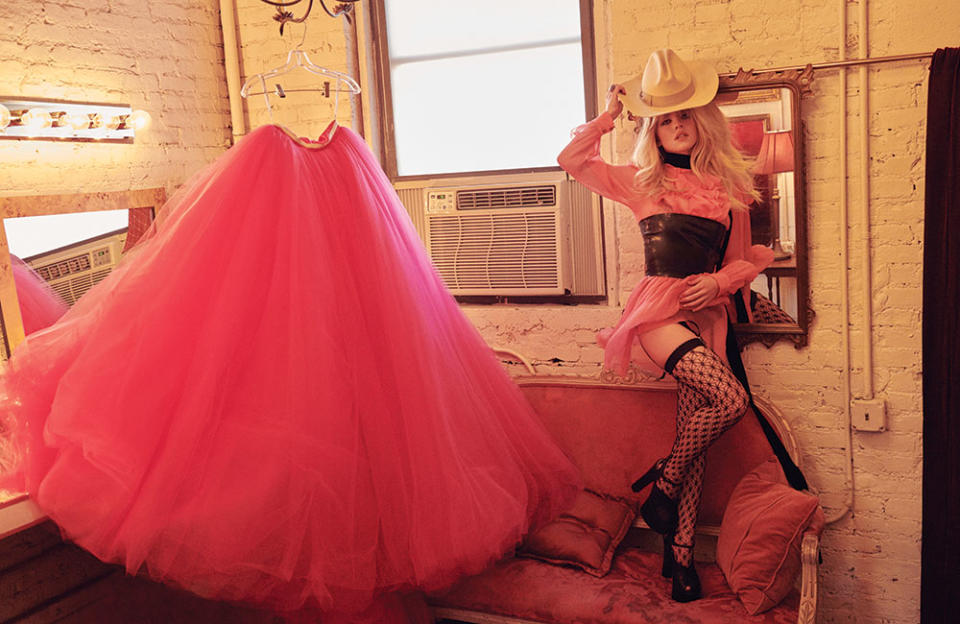
****
Sweeney says that Sharp Objects, Marti Noxon’s 2018 HBO miniseries based on the novel of the same name, was her first truly successful audition. She read with the director, the late Jean-Marc Vallée, and it felt “amazing.” She booked a role as Alice, a patient at a mental health facility whose death haunts star Amy Adams. It would be her first of several dramas on the premium cable network as well as the first of many jobs alongside established actresses, including Elisabeth Moss on The Handmaid’s Tale. Sweeney remembers Adams for her advice about balancing a successful acting career and her desire to have a family — in March, reports surfaced that Sweeney was engaged to restaurateur Jonathan Davino after she was photographed with an engagement ring; she declines to comment on her relationship status and doesn’t wear a ring to the interview. “I want to have a family, I’ve always wanted to be a young mom, and I’m worried about how this industry puts stigmas on young women who have children and looks at them in a different light,” she says. “I was worried that, if I don’t work, there is no money and no support for kids I would have.”
Adams assured her it could be done, but the insecurities over her financial health and the momentum of her career remain years later. There’s no longer a pressure to say yes to every offer, and she’s learned not only to negotiate her salary but to revel in the process of standing up for herself, yet she’s filling her schedule with as many movies and series as she can pack in. “If I wanted to take a six-month break, I don’t have income to cover that,” she says. “I don’t have someone supporting me, I don’t have anyone I can turn to, to pay my bills or call for help.” Surely HBO paychecks afford a lifestyle immune from rising gas prices? “They don’t pay actors like they used to, and with streamers, you no longer get residuals,” Sweeney notes. “The established stars still get paid, but I have to give 5 percent to my lawyer, 10 percent to my agents, 3 percent or something like that to my business manager. I have to pay my publicist every month, and that’s more than my mortgage.” It’s not that she wants people to feel badly for her, but she is adamant that the luxuries of the job not gloss over the realities of the business. To stay relevant as a young actress, particularly one so deeply entrenched in and reliant on the internet generation, requires investment. There’s a lot of press to do, and the associated costs — styling, tailoring, hair and makeup, travel — aren’t always covered by a network. She says this is what motivated her pivot into brand deals, taking gigs as a Miu Miu ambassador and starring in an Armani beauty campaign: “If I just acted, I wouldn’t be able to afford my life in L.A. I take deals because I have to.”
After five years of constant work, she was able to buy a home in Los Angeles — something that’s still deeply out of reach for many of the city’s residents — and almost instantaneously the location leaked onto real estate blogs. She was scrolling through TikTok one day and discovered a trend in which college students (the house is near one of the city’s universities) drive past her front door and try to get a picture. Paparazzi have been camped out, ignoring personal pleas from her mother to pack up and leave. I mention the Kardashians, ensconced in their gated communities far outside the city, and she deadpans that she maxed out with this home purchase; there’s nothing left for a gate. “I couldn’t believe I was even able to buy a house,” she says. “I want to be able to stay there.”
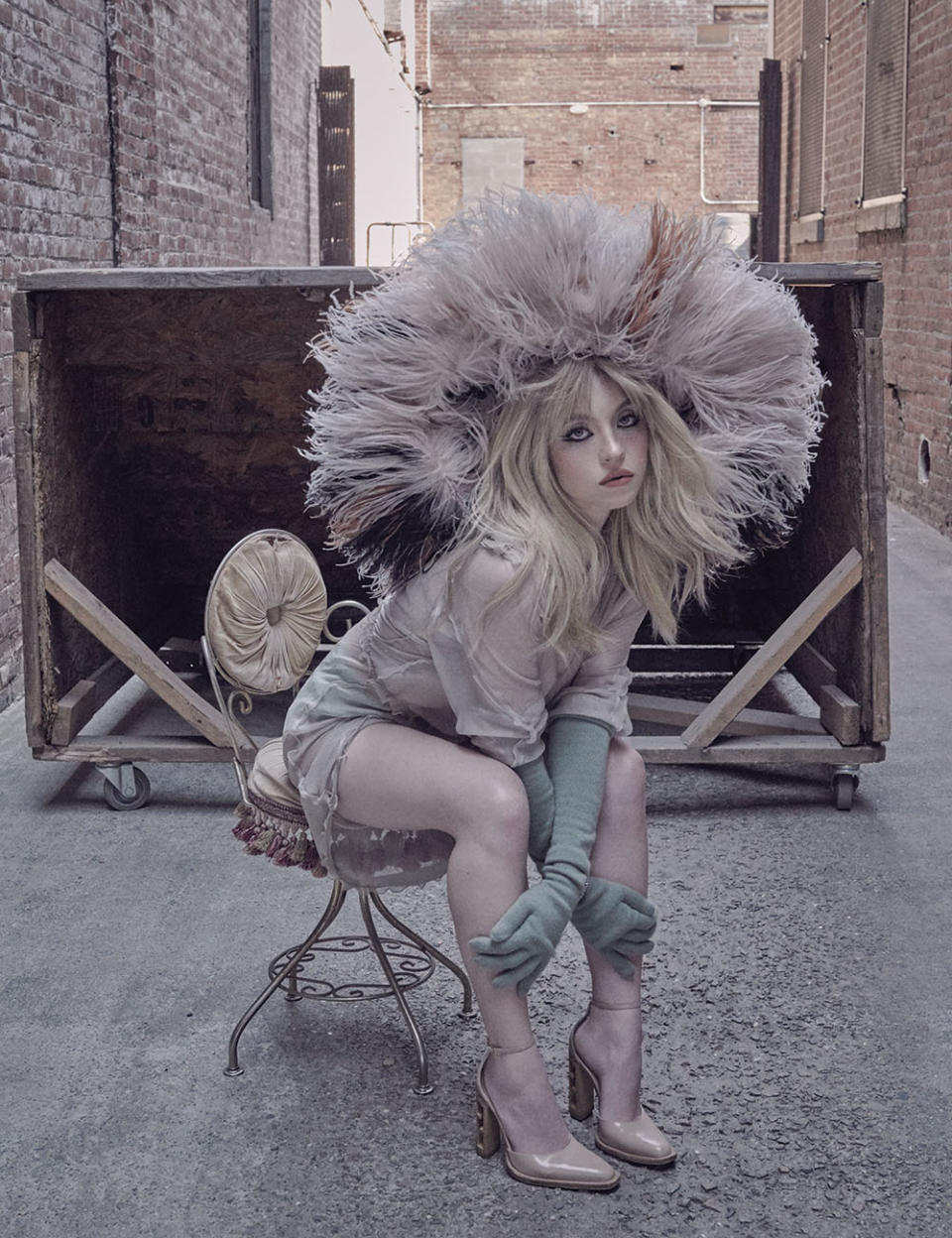
***
“The first time I saw her transform into this petulant child [on The White Lotus], I was shocked,” says Britton. “But she’s also so funny. We were exploring these vitriolic relationships while we had the time of our lives.” In the audition process, White was taken by Sweeney’s decision to play Olivia Mossbacher with an air of intimidation rather than the straightly funny approach other actresses took. “And then she’s obviously nothing like that as a person, so that all felt really exciting,” he says. “She’s very likable and charming, but then you put her in front of a camera and — I don’t want to sound like some Old Hollywood freak — but she has these powers. Certain actors have a certain kind of magic, and she is definitely one of them.”
Due to network scheduling, The Handmaid’s Tale made it to air before Sharp Objects, marking it as her onscreen introduction for many viewers. She played Eden, a teenaged handmaid assigned to an arranged marriage with Max Minghella’s Nick in the second season. It was a supporting but impactful role. It became the first time she was recognized in public with frequency, often by women who felt compelled to tell her they hate her character: “I think most people wanted Elisabeth’s [Moss] and Max’s characters to be together, and Eden disrupted that.”
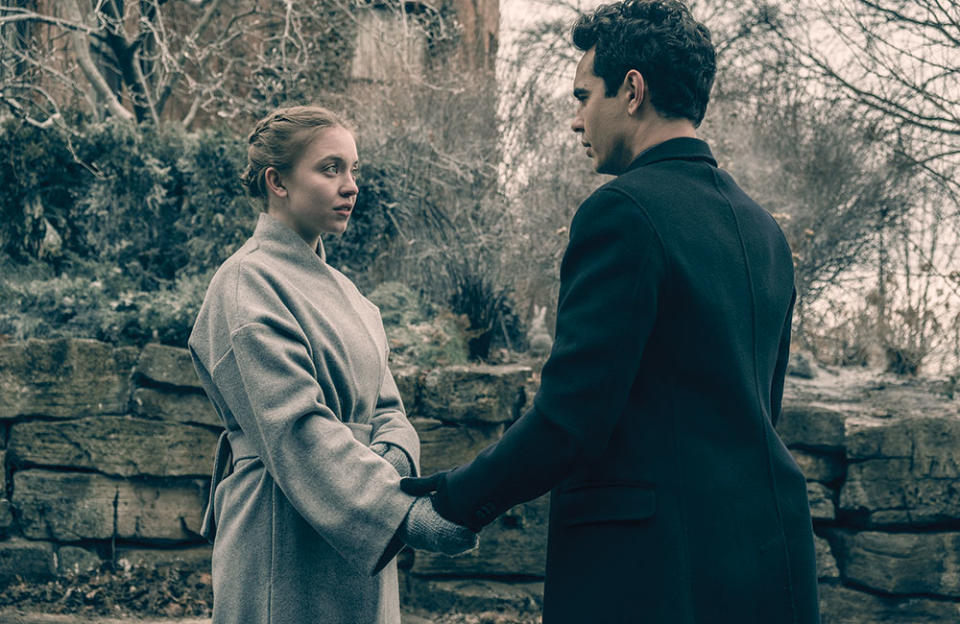
Handmaid’s Tale was nominated for 20 Emmys that year, with the entire cast in attendance. This year’s telecast, which NBC is set to air Sept. 12, Sweeney’s 25th birthday, will mark her return. Zendaya was the only Euphoria castmember to receive a nod, for the show’s first season, and Sweeney says her own nom came as a surprise: “Of course I was hoping for Euphoria because I’m so proud of my character and I put a lot into it, but I didn’t think I was going to get it because of the other actresses who gave such incredible performances this year.”
Francesca Orsi, head of drama and executive vp programming at HBO, calls the double nomination a thrilling moment for the network: “Sydney has an incredible ability to create unforgettable, breakout performances, and with Cassie and Olivia, she brought such versatility to her portrayal of these two very different young women.”
The show’s second season, for which she is nominated, focuses on the burgeoning addiction of Zendaya’s Rue while also pitting Maddie (Alexa Demie) against Cassie as Sweeney’s character self-destructs with her best friend’s ex-boyfriend (Jacob Elordi’s Nate). Sam Levinson, who has near total creative control over the show (he’s the creator, director and sole staff writer), called Sweeney during the hiatus between the first and second seasons. “He read me that first scene where Cassie and Nate go into the bathroom,” she says of the ill-fated couple’s first secret hookup. “And I was like, ‘Oh my God, Sam, you’re a madman.’ ” The plot twist paid off, spurring one of the constantly memed series’ most viral images (of Cassie hiding in the bathtub, face struck with fear) and laying the groundwork for her eventual snot-ridden breakdown monologue (“I have never, ever been happier!”) that felt like the star’s clear Emmy submission. “I feel really bad for Cassie; she’s losing herself so much,” Sweeney says of her character. “But I thrive doing that shit. People talk about how heavy this season is, but I love it.”

There also have been reports about the way Levinson handles the making of the show: Guest stars like Minka Kelly have given interviews about initial drafts of scripts they felt were overly sexual, there were rumors of actress Barbie Ferreira feuding with the creator, and HBO was forced to issue a statement in response to concerns over long working hours, saying the set was in “full compliance with all safety guidelines and guild protocols.” Levinson declined to participate in this story, and Sweeney declines to discuss this element of the show in much detail, noting, “I fully trust in the filmmakers that I work with, and I’m always so excited for whatever Sam writes.” She adds that she forgets a lot of the minutiae of her shows and what it’s like behind the scenes: “It’s as if it’s someone else’s life.” This could be an evasion, but at the photo shoot a few hours after our breakfast, I see her lose herself so completely, I’m almost willing to buy it. When the cameras click on, Sweeney gets so laser focused, it’s almost like she’s dissociating. She tells me that, in photo shoots and on red carpets, she’ll even create a persona for herself, a way to calm her nerves and add a layer of armor between who she really is and who the job requires her to be. (The version you see in the cover photo is “Daphne.”)
“People forget that I’m playing a character, they think, ‘Oh, she gets naked onscreen, she’s a sex symbol,’ ” she says, referring to her many nude scenes in Euphoria. “And I can’t get past that. I have no problems with those scenes, and I won’t stop doing them, but I wish there was an easier way to have an open conversation about what we’re assuming about actors in the industry.”

She’s trying to put a bit of that power back into her own hands with the launch of her production company, Fifty-Fifty Films. The first project on the slate is an adaptation of Jessica Goodman’s 2020 YA novel They Wish They Were Us; it’s set as a limited series at HBO Max under the new title The Player’s Table. It’s a murder mystery that takes place at an elite East Coast private school, and Goodman describes it as a story about a young woman (Sweeney) grappling with class dynamics and sexual politics and trying to find agency in her life. “When we met, it was immediately obvious to me that Sydney was very savvy, that she was very self-aware about the way she is viewed in the world and that she wanted to take charge of her own career,” says Goodman. “People underestimate young women in all industries, but especially in media and entertainment. She is such a force and really knows how to get things done in a way that might surprise people who only watch her on TV.”
As Sweeney starts to transition into the next phase of her career, she’s thinking a lot about her professional values. One of the most disconcerting things she’s noticed about the industry is the way it fails to facilitate loyalty — whether to yourself and your beliefs or to the people around you. “It’s built to try to make you backstab people,” she says. “It’s insane. My agent is my best teammate, and I’ll have her forever.” But, she adds, “I see how people are like, ‘We support each other’ — and I’m like, ‘No. You fucking don’t.’ ” I ask her whether she has people to commiserate with. No. Not the other girls from Euphoria? “We don’t really talk about that kind of stuff,” she says.
While fame has expanded her awareness of the way the world works, it’s having a chilling effect on her personal life. “I can feel my bubble of who I can talk to and share intimate things with and have relationships shrinking, shrinking, shrinking,” she says, explaining that she experiences it as a loss of control. “You’ll write about this and people won’t believe what I say. And that’s really, really hard.”
This story first appeared in the July 27 issue of The Hollywood Reporter magazine. Click here to subscribe.
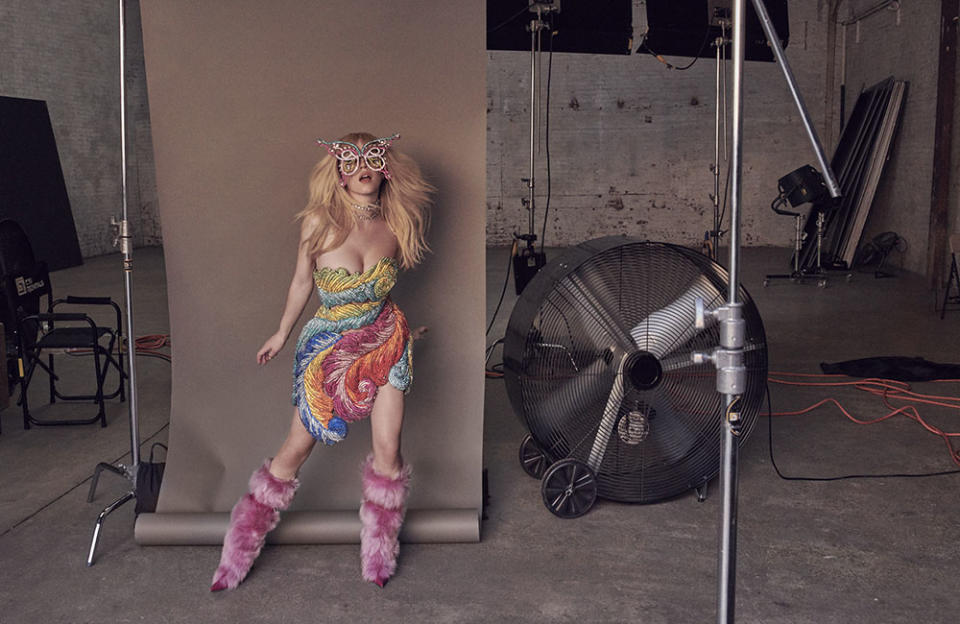
Best of The Hollywood Reporter

 Yahoo News
Yahoo News 
